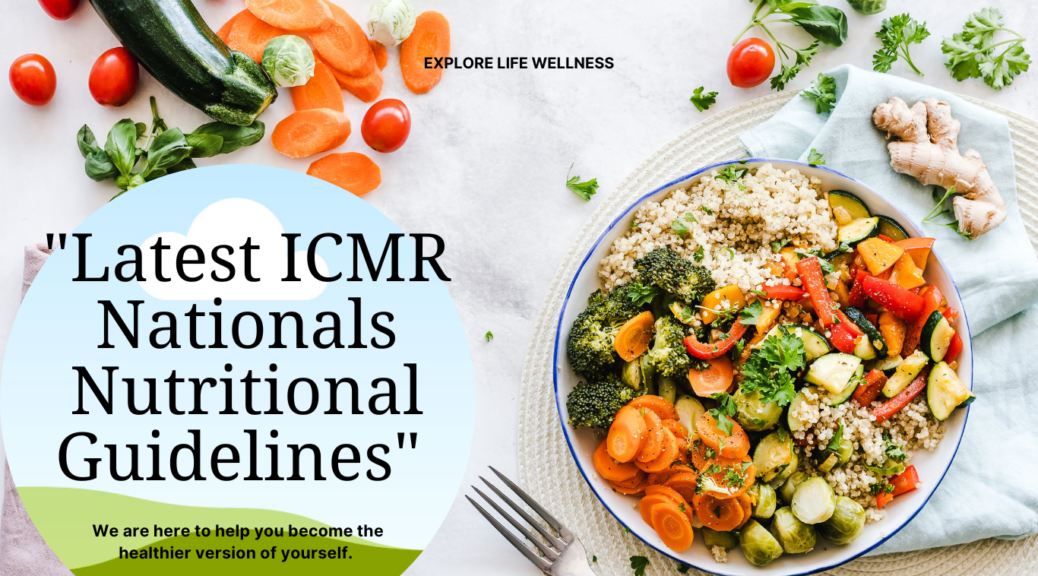
Latest ICMR revised National Nutrition Guidelines
Introduction
Indian Council of Medical Research(ICMR) and the National Institute of Nutrition(NIN) has recently revised national nutrition guidelines, highlighting significant findings regarding the health and nutrition of children. They have jointly released comprehensive set of 17 dietary guidelines aimed at preventing nutrient deficiencies for Indians. Lets see the importance of being aware of and addressing micronutrient deficiencies in children to ensure their long-term well-being. In this blog we will discuss the revised nutritional guidelines, finding from nutritional survey and possible ways to improve nutritional health.
ICMR Revised National Nutrition Guidelines
Recently there was an update on nutritional guidelines nearly after a decade. These guidelines provide a comprehensive overview of the nutritional needs of various age groups, particularly focusing on children. The complete document is available for download in sources section of this blog, offering detailed information on the recommended nutritional practices.
Alarming Findings about Nutrition’s
According to the national nutritional survey 2019, children categorized into different age groups and examined their micronutrient deficiencies and prevalence of non-communicable diseases. The key findings include:
Micronutrient Deficiencies
- Folate (Vitamin B9): Essential for brain development and prevention of depression, folate deficiency was found in 36% of children aged 10 to 19.
- Vitamin D: Deficiency surged notably between the ages of 9 and 10, with nearly a quarter of the surveyed population showing inadequate levels. This is mostly because children are spending less time playing outdoors, but they are busy indoors with digital gadgets.
- Vitamin B12: Particularly high deficiency rates were observed in teenagers, with 30.9% showing low levels. Vegetarian children are at a higher risk due to the limited sources of B12 in a plant-based diet.
Non-Communicable Diseases
The survey also revealed concerning statistics about the prevalence of non-communicable diseases among children:
- Pre-Diabetes: Almost 10% of the children surveyed were found to be pre-diabetic, largely due to high consumption of processed foods and sugary beverages.
- High LDL Cholesterol: Bad cholesterol levels were alarmingly high at 28.2%, indicating poor dietary habits and lifestyle choices.
Best ways to Improve Nutritional Health
There are multiple ways to improve our nutritional health. We emphasizes the importance of proactive testing and dietary adjustments to ensure children receive the necessary nutrients. Some of the possible ways includes:
- Testing for Deficiencies: Regular blood tests or genetic tests (for children who fear needles) can help identify deficiencies early.
- Dietary Adjustments: Incorporating foods rich in essential vitamins and minerals into children’s diets can address deficiencies. For instance, increasing the intake of foods high in Vitamin B12 and D.
- Limiting Junk Food: Like reducing the consumption of processed and sugary foods, which contribute to health issues like pre-diabetes and high cholesterol.
Societal and Parental Influence on Nutritional Health
There are few factors which can impact the children’s lifestyle. The societal and parental influences on children’s eating habits includes:
- Peer Pressure and Advertising: Children are often influenced by their peers and advertisements to consume unhealthy foods. This peer pressure can lead to poor dietary choices and habits.
- Parental Responsibility: Parents play a crucial role in shaping their children’s eating habits. By making informed choices and encouraging healthy eating, parents can help their children develop lifelong healthy habits.
The 17 New ICMR Dietary Guidelines For Indians
- Eat wholesome and varied foods to ensure a balanced diet.
- Make sure to provide extra food and healthcare during pregnancy and lactation.
- Encourage exclusive breastfeeding for the first six months and continue breastfeeding till two years and beyond.
- Feed the infant homemade semi-solid complementary foods soon after six months of age.
- Provide adequate and appropriate diets for children and adolescents to promote growth and support recovery during illness.
- Eat a rich array of vegetables and legumes.
- Use oils/fats in moderation; choose an array of oil seeds, nuts, Nutri cereals and legumes to meet daily needs of fats and essential fatty acids (EFA).
- Get good quality proteins and essential amino acids (EAA) through the right mix of foods and avoid protein supplements to build muscle mass.
- Lead a healthy lifestyle to avert the risk of building excess abdominal fat, overweight, and obesity.
- Stay physically active and exercise regularly to maintain good health..
- Restrict salt intake and highly processed foods.
- Consume safe and clean foods.
- Adopt appropriate pre-cooking and cooking methods.
- Drink an adequate quantity of water.
- Minimize the consumption of high-fat, sugar, salt (HFSS) and ultra-processed foods (UPFs).
- Include nutrient-rich foods in the diets of older adults for health and wellness.
- Read information on food labels to make an informed and healthy food choice.
Conclusion
The ICMR revised national nutrition guidelines and the findings from the national nutrition survey highlight the urgent need for parents to be proactive about their children’s nutrition. These guidelines for Indians aim to improve healthy eating habits and balanced diet. By following some possible ways like testing for deficiencies, adjusting diets, and promoting healthy eating habits, parents can help prevent serious health issues and ensure their children’s long-term well-being. Also following these guidelines can also results into better and improved lifestyle for everyone.
Sources
- https://main.icmr.nic.in/sites/default/files/upload_documents/DGI_07th_May_2024_fin.pdf
- https://www.nin.res.in/downloads/DietaryGuidelinesforNINwebsite.pdf
- https://main.icmr.nic.in/
- https://www.nin.res.in/
3 thoughts on “Latest ICMR revised National Nutrition Guidelines”
This is really attention-grabbing, You are an overly professional blogger. I’ve joined your rss feed and stay up for in the hunt for more of your fantastic post. Additionally, I have shared your site in my social networks!
Well I truly liked reading it. This subject offered by you is very practical for correct planning.
This is really fascinating, You are an overly professional blogger. I’ve joined your rss feed and look forward to seeking more of your magnificent post. Additionally, I have shared your site in my social networks!